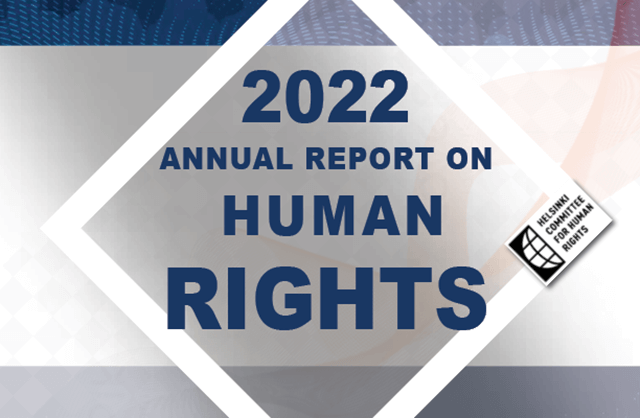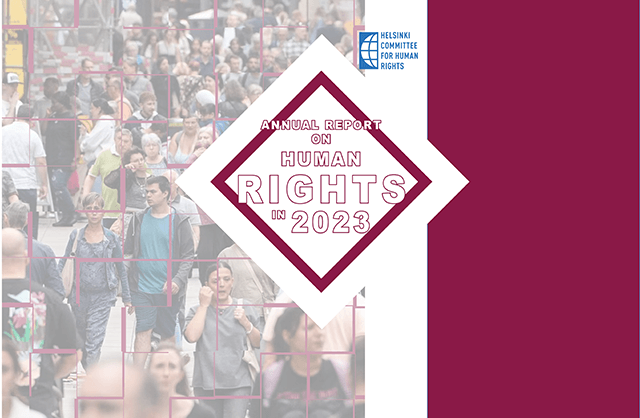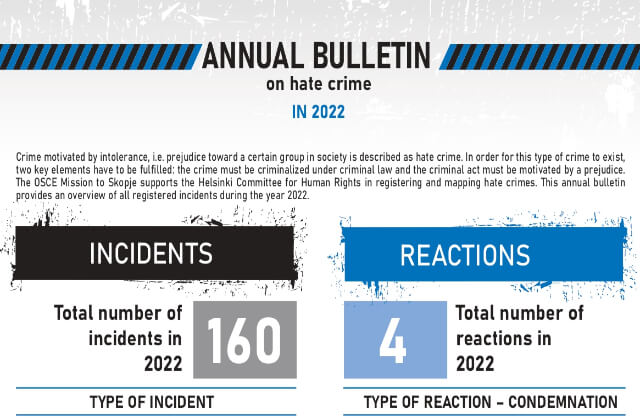Annual report on human rights in 2022
September 4, 2023

The beginning of 2022 was marked by Russia’s military invasion of Ukraine, which resulted in numerous human casualties and continued uncertainty and fear amidst the ongoing pandemic worldwide. Over half a million children have become refugees, with the number of displaced people and refugees steadily rising. The war in Ukraine caused an economic and energy crisis, an even wider gap between the rich and the poor and vulnerable groups are bearing the brunt of the socio-economic consequences.
According to the Helsinki Committee, there was a slight decrease in requests for legal assistance related to labor relations in 2022 compared to the previous year. However, there was an increase in requests for assistance with property-law issues, domestic violence and family relations, and the protection of human rights. One glaring example in the field of labor rights is a case involving a worker from Skopje who turned to the Helsinki Committee for legal assistance. Acting on a complaint filed on her behalf by the Helsinki Committee the State Labor Inspectorate carried out an extraordinary inspection of her employer and determined that for the period while she was employed, not only did she not receive the full amount of her salary, but was also paid sums as low as one, two or ten denars.
After all the demands from trade unions and all the protests by employees in various sectors, a new Law on Labor Relations has not been adopted yet despite the initial efforts made in 2018 to draft the law. Considering the shaken trust of the citizens in the judiciary, the Helsinki Committee at the request of citizens monitored court proceedings or proceedings of wider social interest.
Although cases of violations of health rights are still prevalent in our daily lives, the covid-pandemic has brought to light deep systemic anomalies that have severe consequences for people’s health and lives and enable profiting from the suffering of patients and their families. The Helsinki Committee together with the Investigative Reporting Lab (IRL), the Macedonian Young Lawyers Association and the Young
Doctors Club produced a “Report on the treatment of citizens in private and public health institutions following the call for legal aid by civil society organizations”.
When it comes to gender-based violence, even though a law was put in place in 2021 to define genderbased violence, many institutions still do not recognize it as a form of violence. Instead, they only consider it as domestic violence. This is evident from the reports of civil society organizations, mainly in the provision of free legal aid and/or the monitoring of court cases of gender-based violence. The lenient penal policy, the inefficiency of the judiciary and the prolongation of court proceedings in cases of violence make it more challenging and limit access to justice for victims, which further negatively affects the reporting of gender-based violence. In 2022, the slogan “Poverty has a female face” was a reminder that women still do not enjoy equal rights in almost any aspect of life, at work or at home, in politics and social
life, and that they are more susceptible to the impact of poverty.
From all the cases that show insufficient awareness of the human rights of those who are different and a lack of empathy, the most egregious example was the petition filed by parents against a child with Down syndrome, which represents a defeat for our society when it comes to the attitude towards the most vulnerable among us. These include the incidents and increased hate speech directed against members
of the Jewish religious group “Lev Tahor”, during their temporary stay in North Macedonia, which shows the low level of tolerance towards those who are different and the high level of xenophobia in the society.
In 2022, the Basic Civil Court in Skopje determined that the Government of the Republic of North Macedonia and the State Election Commission committed direct discrimination against persons with disabilities when exercising their right to vote. The court determined that the direct discrimination was committed by not taking, that is, by failing to take actions to adapt the infrastructure and space to and in
part of the polling stations and violated the principle of appropriate adaptation. In this way, the efendants made it impossible for persons with disabilities to exercise their right to vote, and thus hindered the active participation of persons with disabilities in the political life of the state. The basic civil court passed this judgment after the Helsinki Committee for Human Rights, in 2021, filed a lawsuit for
protection against discrimination in the public interest (actio popularis).
During 2022, the Helsinki Committee maintained its oversight of punitive-correctional institutions. Despite the states’, as well as international and domestic organizations’ efforts to improve the conditions of punitive-correctional institutions, systemic inadequacies persist. Prisoners are still unable to access health care, education, adequate living conditions, programs for resocialization and post-penal assistance. Corruption and bribery continue to be a common occurrence in the daily lives of those serving a prison
sentence.
The “Committee” social center celebrated the 10th anniversary of the LGBTI Support Center’s opening. As a subsidiary of the Helsinki Committee for Human Rights, the Center has become a well-known safe haven for LGBTI individuals in the country, offering legal and psychosocial assistance over the past decade. However, hate speech directed towards LGBTI individuals is on the rise. Last year, a total of 36 cases of hate speech based on sexual orientation and/or gender identity were reported, making up 22% of all registered cases of hate speech.
The transgender community remains one of the most vulnerable and at risk of additional stigma, discrimination and violence. During the last year, the state again failed to gather the strength to implement the decision of the Court of Human Rights from Strasbourg, which pertains to regulating the legal recognition of gender.
A shelter called Safe House that offers protection to victims of domestic violence and at risk of homelessness also recorded high rates of hate crimes and hate speech based on sexual orientation and/or gender identity in 2022. The number of individual cases that were taken in by the shelter center Safe House confirms that family and gender-based violence, that is, violence based on sexual orientation and/or gender identity, is the dominant form of violence.
In 2022, a shelter called Safe House that provides refuge to victims of domestic violence and those at risk of homelessness, experienced a concerning number of hate crimes and hate speech incidents based on sexual orientation and/or gender identity. The shelter reported a high number of cases related to family and gender-based violence, emphasizing that violence based on sexual orientation and/or gender identity
is the most prominent form of violence.
The annual report of the Helsinki Committee for 2022 features individual cases that highlight deep-seated systemic issues and their impact on citizens’ rights in our country.
Based on the findings resulting from the work of the Helsinki Committee, we conclude that no significant improvements have been made in the legal and institutional system for the protection and promotion of human rights.

